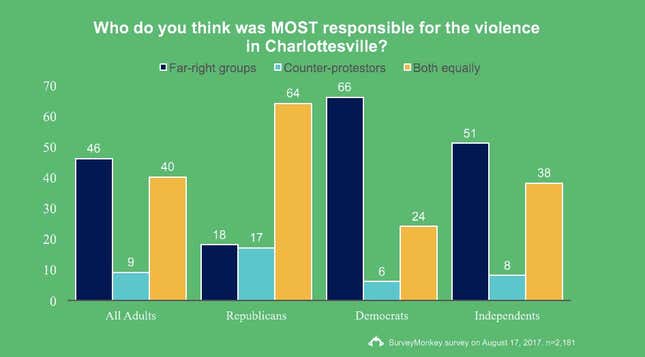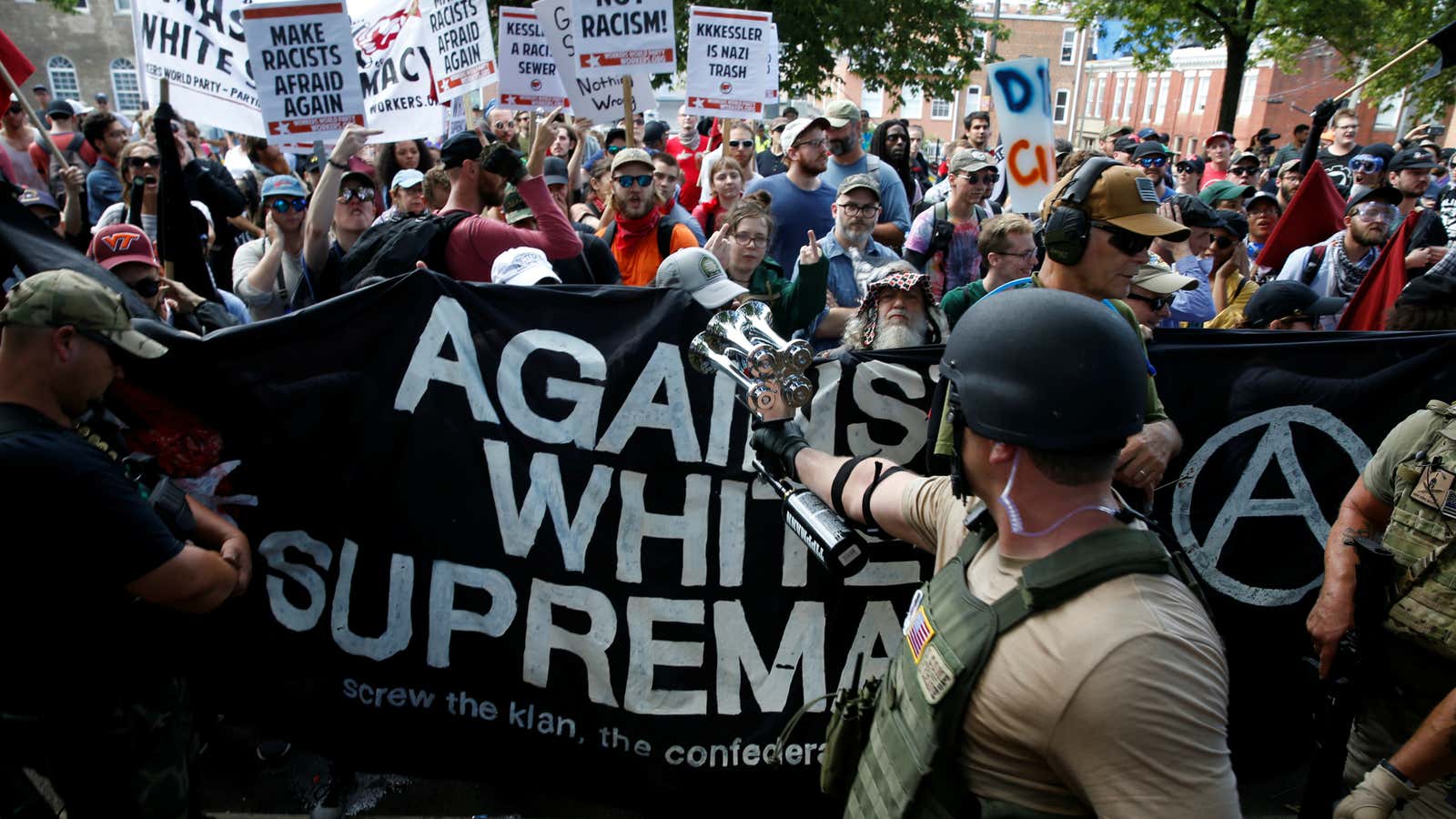Which side—the white nationalists or the counter-protesters—bears greater responsibility for the Charlottesville violence, which directly resulted in the death of a 32-year-old counter-protester? It should be a factual question. And also a moral one, considering that the demonstrators had gathered in the spirit of a homegrown terror group that lynched thousands of blacks and a foreign one that murdered around 6 million Jews.
Yet in the America of the moment, the question is a political one.
Only 18% of Republican respondents blame the white-nationalist groups for the bulk of the Charlottesville violence, according to a SurveyMonkey poll with 2,181 participants, via Axios. (Update: Note that this was not a scientific poll—here is the methodology—and may not be representative of the view of all Americans.) Some 64% think both sides share responsibility equally. Perhaps more alarmingly, only 46% of all the respondents put the blame on the white nationalists, while four in 10 condemn both sides equally.

To be clear, people from both sides beat each other up. But if you want to get into who started it and who was the most violent, the answers seem pretty clear.
For starters, a 32-year-old woman is dead, crushed when, police say, a white supremacist mowed his car into a crowd of counter-protesters. Heather Heyer and thousands of others—including antifascists armed with shields and sticks, but mainly local residents, civil-rights groups, and church groups—had been legally demonstrating against the white nationalists—neo-Nazis, Ku Klux Klan, neo-Confederates, and alt-right supporters, flanked by gun-gripping militiamen—gathering to celebrate the statue of a seditious general who once fought to keep blacks enslaved. Brawling broke out after the white nationalists reversed course on a plan that would have separated them from the counter-protesters; a phalanx of white nationalists carrying big shields and truncheons charged a group of counter-protesters blocking their path, attacking with sticks, punches, and sprayed chemicals, according to the Charlottesville police chief.
What explains the parallel narratives of what happened in Charlottesville? As Axios’ Mike Allen put it, “These findings reflect the fact that, because of the nation’s partisan divide and fractured media, we no longer agree on basic facts. That makes civil debate impossible.”
Of course, it’s not hard to guess why the “both equally” narrative enjoys such perverse favor. The most prominent proponent of that logic happens to have the loudest voice in America.
In a press conference Aug. 15, president Donald Trump shrugged off the moral difference between agitating for institutionalized white supremacy and protesting those beliefs. Asked if the counter-protesters he described as “alt-left” are the equivalent of neo-Nazis, Trump ducked the question. This is how he described the violence in Charlottesville: ”You had a group on one side that was bad, and you had a group on the other side that was also very violent.”
Nearly nine in 10 Republicans agrees with the president, according to the poll. Democrats and Independents disagree at rates of 83% and 59%, respectively.
Trump’s go-to news source is Fox News, which has been banging the moral-equivalency drum and frequently absorbs the narratives put forth by alt-right media. And the theme they’ve emphasized in the wake of the Charlottesville tragedy is the double-standard to which white people are subjected when they try to assert their rights.
It’s not surprising this motif would disproportionately appeal to Republicans. A lot of whites—and 86% of Republicans are white, according to Pew—feel that their economic and cultural interests have taken a backseat to those of minorities and that they’ve been forced to celebrate “multiculturalism” at the expense of their own ethnic heritage.
Update: This post was updated at 9:45am on Aug. 21 to indicate that the SurveyMonkey poll was not scientific. Specifically, the data cited in this story were based on an internet survey of 2,181 American adults conducted on Aug. 17 (see methodology). Survey respondents were asked questions about Donald Trump, Charlottesville, and racism in America, as well as demographic questions about their gender, race, age, and political orientation.
